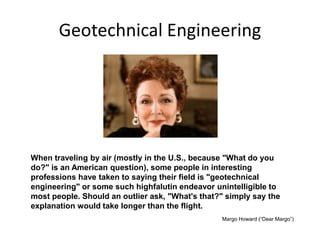The Of Geotheta
Wiki Article
Geotheta Fundamentals Explained
Table of ContentsMore About GeothetaWhat Does Geotheta Mean?Geotheta for Beginners3 Simple Techniques For GeothetaThe 3-Minute Rule for Geotheta

They conduct site examinations, accumulate samples, do research laboratory tests, and evaluate information to review the suitability of the ground for building jobs - Geo Tech Engineer. Based upon their findings, geotechnical engineers offer suggestions for structure layout, incline stability, keeping frameworks, and reduction of geotechnical threats. They team up with other specialists, such as designers, architectural engineers, and building and construction teams, to make certain that geotechnical factors to consider are integrated right into the overall job layout and implementation
By evaluating the habits and properties of dirt and rock, they can determine prospective geotechnical risks such as landslides, soil settlement, or slope instability. Their knowledge helps avoid failures or accidents that could endanger lives and home. Here are some in-depth responsibilities and obligations of a geotechnical designer: Website Examination: Geotechnical designers conduct site examinations to collect data on subsurface conditions.
They analyze the data to understand the residential properties and actions of the dirt and rock, including their toughness, leaks in the structure, compaction characteristics, and groundwater conditions. Geotechnical Analysis and Layout: Geotechnical designers analyze the data accumulated throughout website examinations to examine the security and viability of the site for building jobs. They carry out geotechnical computations and modeling to assess factors such as birthing ability, negotiation, slope security, side planet pressures, and groundwater flow.
The Best Guide To Geotheta
Foundation Layout: Geotechnical engineers play a vital function in developing foundations that can safely support the intended framework. They evaluate the soil problems and load demands to identify the appropriate structure type, such as superficial foundations (e.g., footings), deep structures (e.g (https://www.cheaperseeker.com/u/geotheta)., heaps), or specialized strategies like dirt enhancement. They think about aspects such as settlement limits, birthing ability, and soil-structure communication to establish optimal foundation layoutsThey examine building plans, monitor website activities, and conduct field examinations to validate that the design suggestions are followed. If unforeseen geotechnical concerns arise, they analyze the circumstance and offer recommendations for removal or modifications to the design. Threat Evaluation and Reduction: Geotechnical engineers assess geotechnical threats and dangers related to the task site, such as landslides, liquefaction, or soil disintegration.

Cooperation and Communication: Geotechnical engineers work carefully with various other specialists included in a project, such as designers, structural designers, and building groups. Effective interaction and collaboration are vital to integrate geotechnical factors to consider right into the general job layout and building and construction process. Geotechnical engineers supply technological experience, solution inquiries, and ensure that geotechnical needs are satisfied.
Indicators on Geotheta You Need To Know
Here are some sorts of geotechnical designers: Foundation Designer: Structure designers concentrate on designing and analyzing foundations for frameworks. They evaluate the soil problems, lots needs, and website attributes to determine one of the most suitable foundation kind and design, such as shallow structures, deep structures, or specialized strategies like pile foundations.They examine the factors influencing incline stability, such as soil homes, groundwater problems, and slope geometry, and create approaches to avoid slope failures and alleviate dangers. Quake Engineer: Quake designers specialize in analyzing and creating frameworks to hold up against seismic forces. They assess the seismic my review here danger of a site, evaluate soil liquefaction potential, and establish seismic design criteria to guarantee the security and resilience of frameworks during earthquakes.
They carry out field testing, collect examples, and evaluate the gathered information to identify the soil residential or commercial properties, geologic formations, and groundwater problems at a site. Geotechnical Instrumentation Engineer: Geotechnical instrumentation designers concentrate on tracking and measuring the actions of soil, rock, and structures. They set up and keep instrumentation systems that monitor elements such as dirt settlement, groundwater levels, slope activities, and architectural displacements to assess performance and supply early warnings of potential problems.
The Facts About Geotheta Uncovered
They conduct tests such as triaxial tests, debt consolidation examinations, straight shear tests, and leaks in the structure tests to gather information for geotechnical analysis and design. Geosynthetics Engineer: Geosynthetics designers specialize in the design and application of geosynthetic products, such as geotextiles, geogrids, and geomembranes. They use these materials to enhance soil security, strengthen inclines, offer water drainage remedies, and control disintegration.They have a tendency to be investigative people, which suggests they're intellectual, introspective, and inquisitive. They wonder, methodical, sensible, analytical, and rational. Several of them are additionally social, meaning they're kind, generous, cooperative, client, caring, valuable, compassionate, sensible, and pleasant. Does this seem like you? Take our cost-free occupation examination to find out if geotechnical engineer is among your top occupation suits.
In the workplace setting, geotechnical engineers utilize specialized software application tools to perform calculations, develop styles, and evaluate data. They prepare records, testimonial task requirements, connect with customers and staff member, and coordinate task tasks. The office setup gives a favorable environment for study, evaluation, and partnership with other specialists associated with the project.
The Main Principles Of Geotheta
They frequently go to task sites to perform website investigations, examine geotechnical conditions, and collect data for analysis. These gos to involve traveling to various places, often in remote or difficult terrains. Geotechnical engineers might do soil tasting, conduct tests, and display construction tasks to ensure that the geotechnical aspects of the project are being applied properly.Geotechnical designers likewise function in specialized geotechnical labs. Geotechnical laboratory designers function extensively in these settings, managing testing equipment, running instruments, and videotaping information.
Report this wiki page